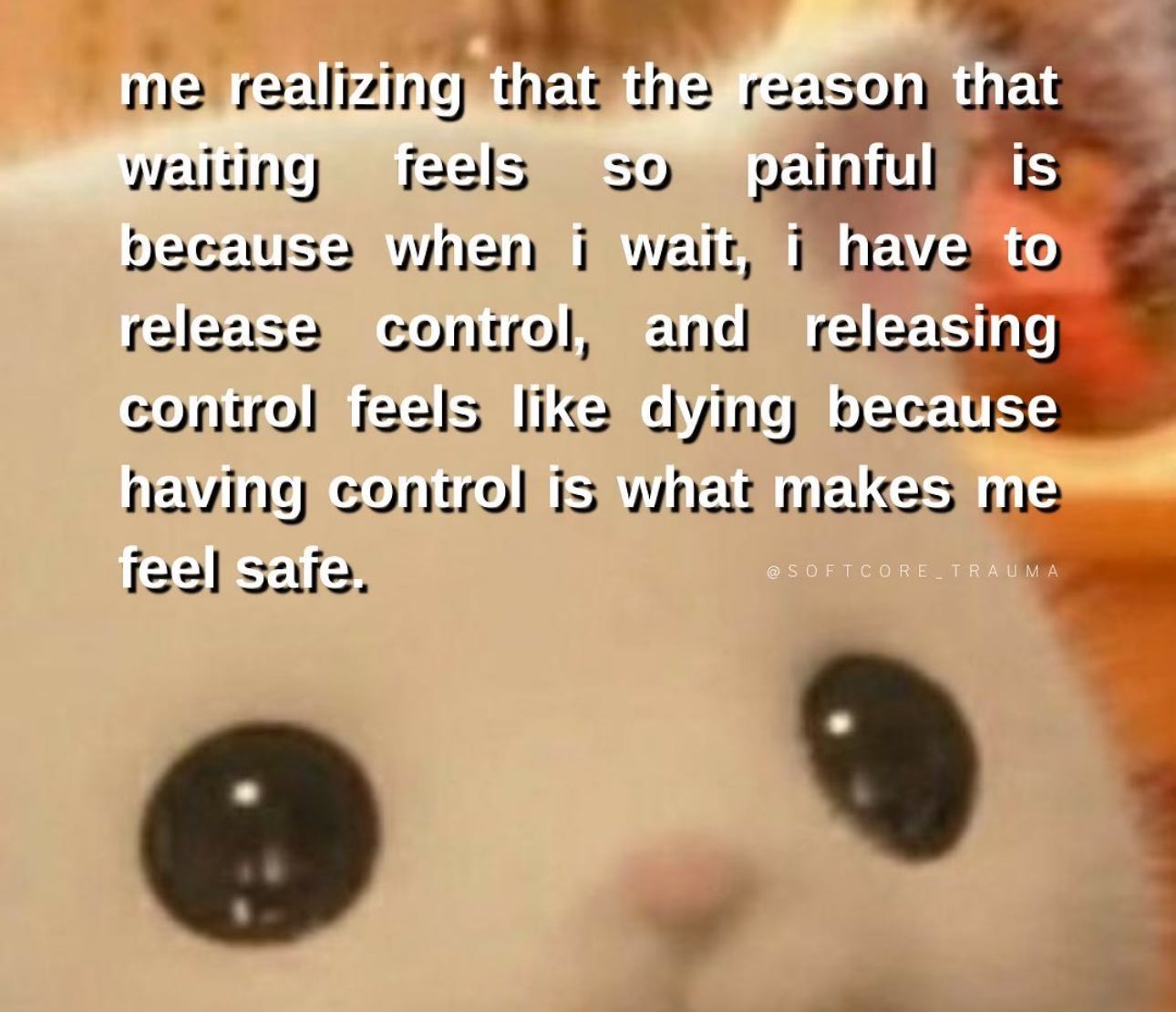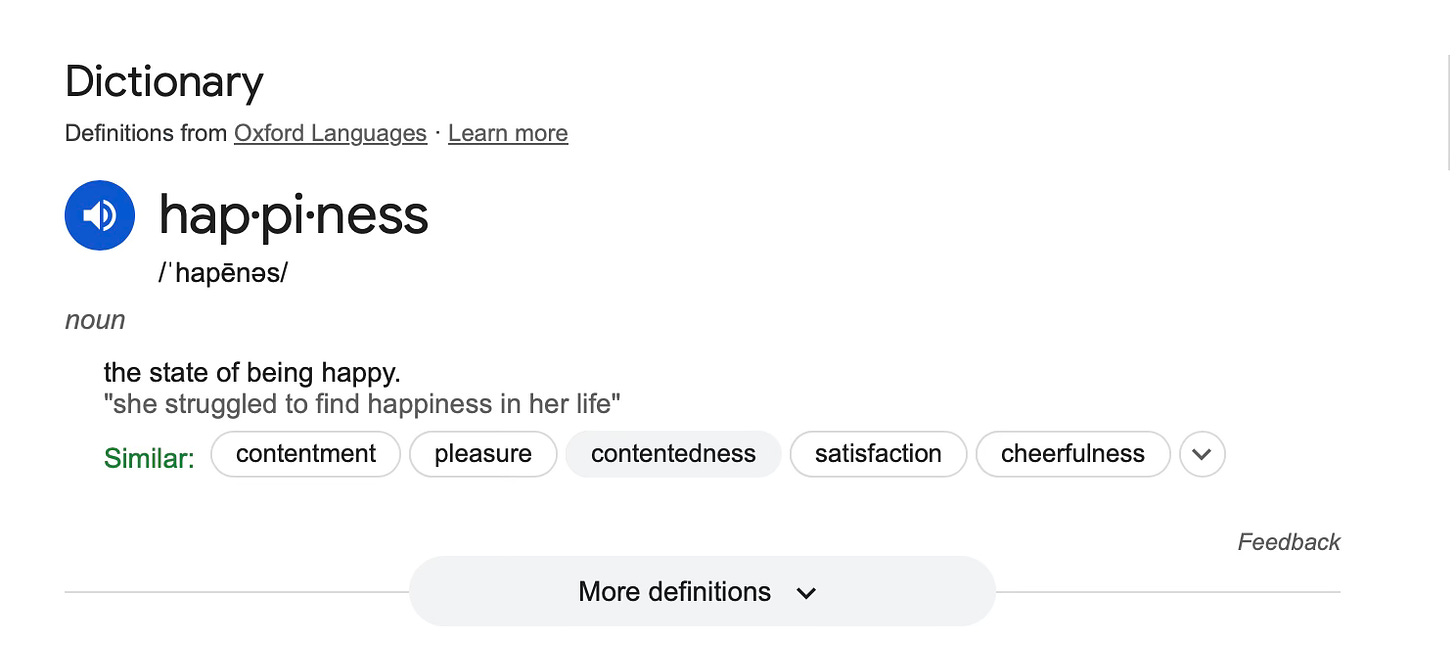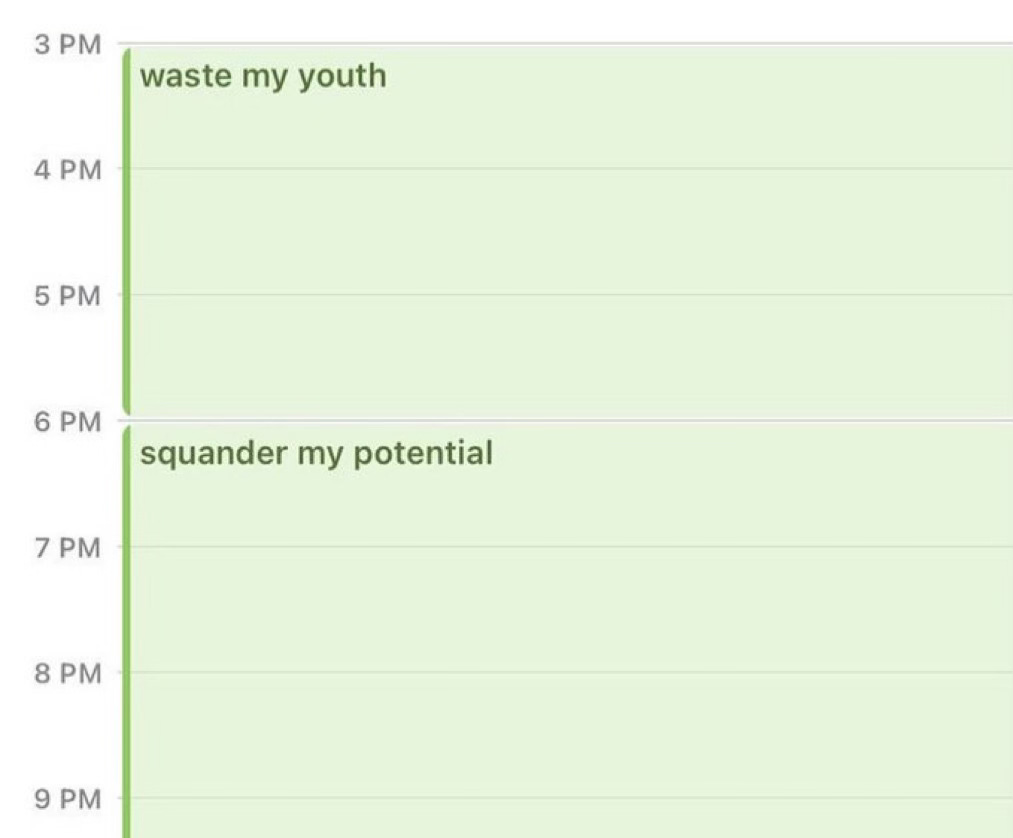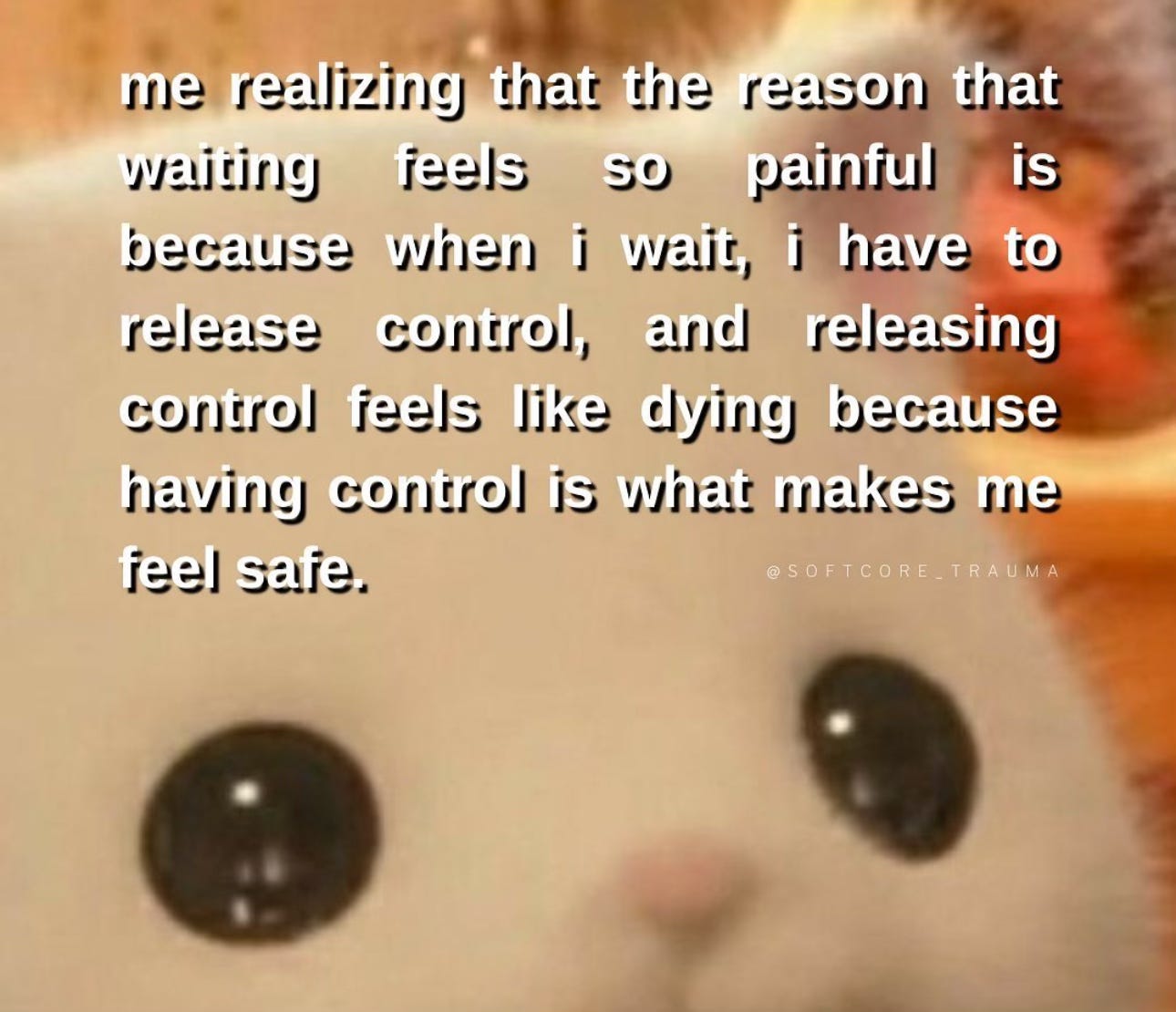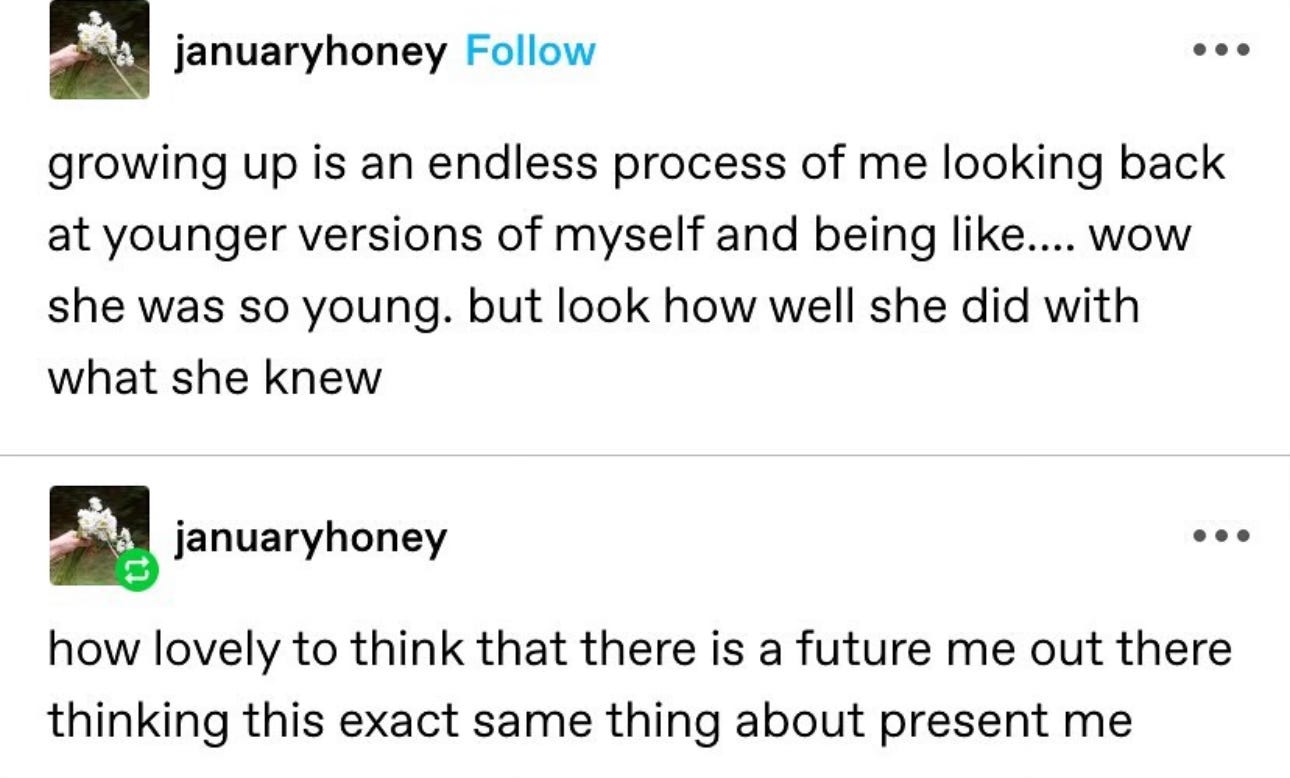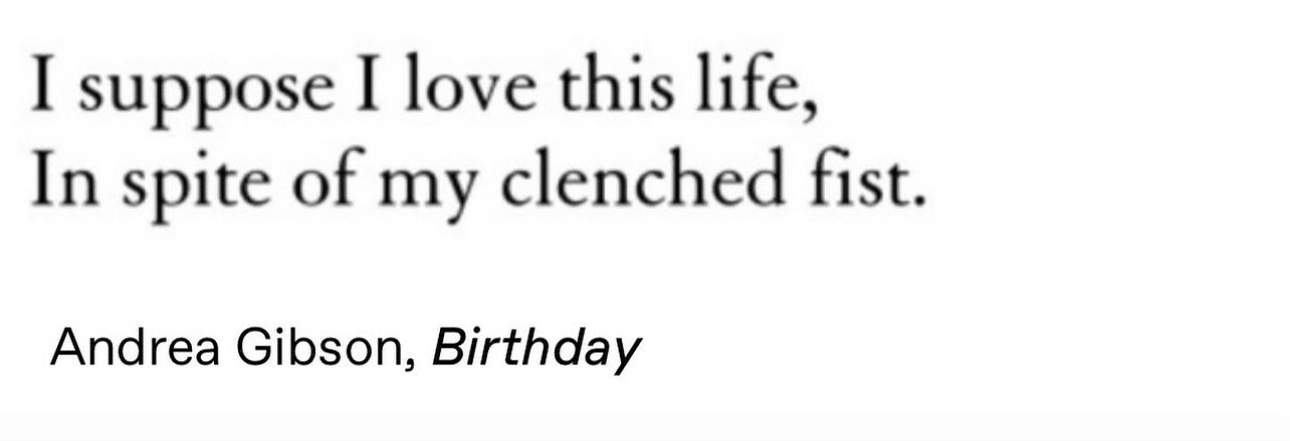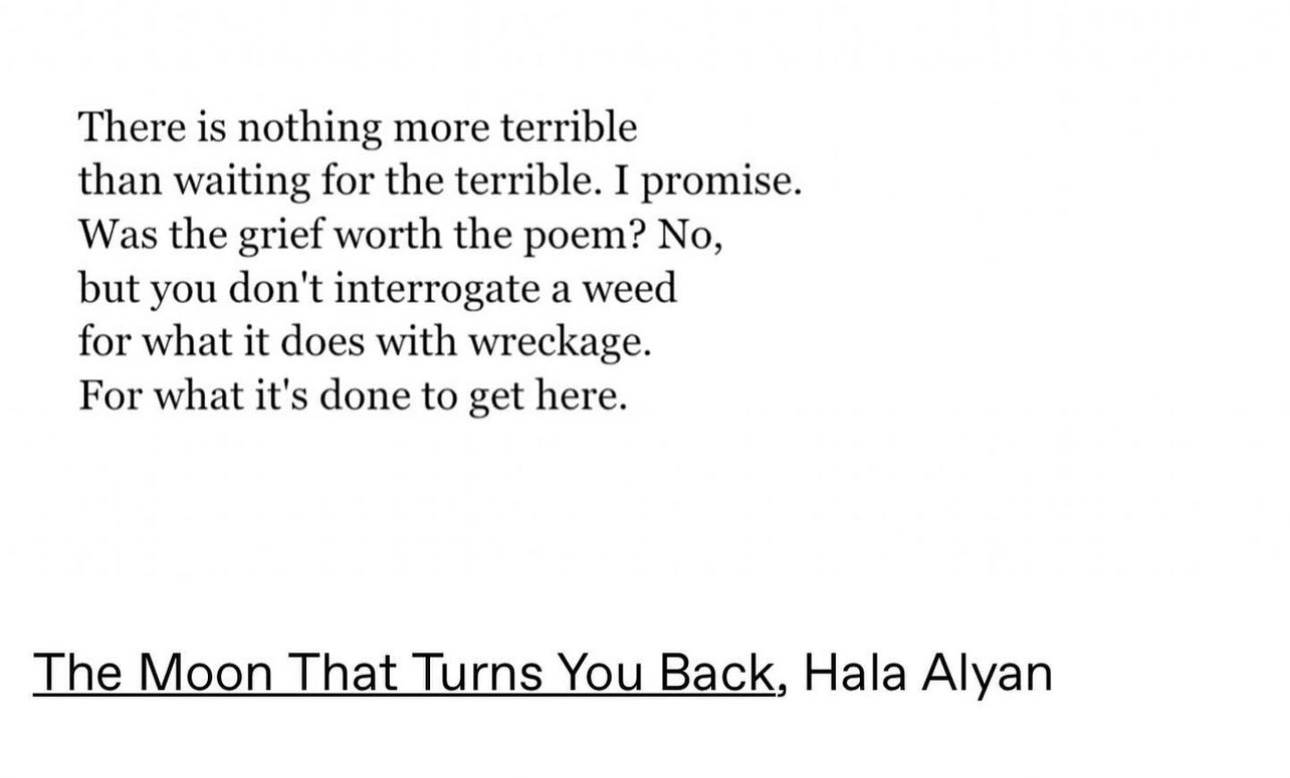do you ever feel like you'll never achieve true long-term happiness?
hey chat, wtf is "happiness" and why does it feels so impossible to achieve?
Happy spring solstice chat, can you believe we made it through another winter? I thought we were goners for a minute there I won’t lie.
Let me preface this by stating that this month’s newsletter is a bit of a doozy - we’re gonna explore the inner workings of the idea of happiness. Yipee!
I don’t know if it’s because I recently turned 25 and was thrust into a rather major existential crisis, but over the past few months, I’ve gone through some massive shifts in how I view and relate to the world. Like, duh Sierra, that’s what happens when you grow up.
I don’t think my experience is necessarily special or revolutionary, but I’m sharing it with you with the hope that you find some comfort in exploring the existentialism of the human experience together <3
Long story short: recently I’ve been stuck in a seemingly inescapable inner void. You know, that feeling in the pit of your stomach that seems to hold you hostage, especially during the wee hours of the night when you’re laying in the dark alone overthinking every little thing you’ve ever said or done?
Well, during the last decade or so I’ve tried just about everything to silence that void. My coping strategies as a child weren’t necessarily dangerous: I would escape it through reading, gaming, watching movies, and scrolling on the internet (seriously, I don’t think I ever gave myself a moment of silence).
But naturally, as we age, our old strategies tend to age out with us and cease to work as well as they once did. Which is when we can fall into much more dangerous and unhealthy vices. At least I did.
Before we go on, it’s important for me to take a quick second to state that the following deals with some heavier topics which may be a bit triggering to some. I want to preface by saying that I’m able to talk about this stuff openly and without judgment after years of therapy and deep inner healing work. You should not feel pressure to disclose your healing journey with anyone else until you are ready, especially not to a public audience. I have developed the skillset to transparently talk about it and to shine a light on it to help others understand they are a) not alone and b) are not broken and are worthy of healing (which is a common feeling many people who experience this have, at least in my experience). This is not meant to encourage nor glamorise the use and abuse of substances or any other unhealthy coping mechanisms.
It has taken me years of very uncomfortable self-healing work to be able to express, and talk about, the shame that falling into unhealthy coping mechanisms tends to leave you with.
Although I feel I am in a good enough mental and emotional place to share these experiences on a public stage, there are still moments I feel shameful about it all. Even as I write this I worry about being judged or looked down upon, which I know is a common experience for many. However, I am pushing through that fear because I feel it’s important to talk about these things to break down the stigma associated with them.
If you are currently struggling, please know there is NOTHING to be ashamed of - you are not broken or damaged or any of the other things you may believe to be factual.
You are simply someone who is hurting, who is trying to numb that pain, and when you’re ready to take the plunge toward healing, I hope you can find comfort, and perhaps even a faction of guidance, in my words.
So let me say this as straightforwardly as possible to avoid confusion: when I was heavily relying on and abusing substances to drown out everything inside of me, I appeared on the outside, to be happy, confident, and “cool”.
At least that’s what I tried to portray on the internet.
But, social media is fake, and the years I spent in a haze of constantly drowning out all of my emotions, and running away from any real intimacy for fear of having to expose myself to the world, were the darkest years of my life.
I felt deeply unhappy and shameful about my behaviours, and I lived with a toxic inner critic who convinced me I would never feel deep human intimacy. I felt so disconnected from myself and my body that oftentimes I couldn’t feel anything at all. But not feeling anything felt safer than opening myself up to the risk of experiencing rejection.
And the cherry on top was that I was great at hiding it, as most people in intense pain are.
It’s not uncommon during times of extreme pain and suffering to experience what is known as alexithymia, which researchers say is “a construct relating to a difficulty experiencing, identifying, and expressing emotions.”
It is not a clinical diagnosis nor is it considered a disorder - it most commonly occurs alongside other mental health conditions such as depression, anxiety, PTSD, eating disorders, etc.
People who experience alexithymia have:
problems with introspection, or observing their own mental and emotional processes
experience confusion around bodily sensations connected to emotions
struggle to communicate their emotions to others
I learned about this condition only recently while reading Bessel Van De Kolk, M.D.’s book “The Body Keeps The Score” (which I recommend and encourage everyone to read, though it can be quite triggering) and it truly felt like an OH SHIT moment for me.
For many years I felt so disconnected from my body, my emotions, and honestly, from most people around me. Despite my friends and family being there for me I struggled to communicate my thoughts, feelings, and experiences. I had a hard time relating to others because I felt like I was constantly floating above myself instead of being an active participant in life.
I talk a lot about how writing saved me in a sense, by providing me with an outlet to express myself and to relate to others. And the truth is, I started writing as a child not to try to understand the world around me but to understand the world inside me.
Ironically, while I was going through what I now consider to be alexithymia, I wrote very very little and had a hard time feeling connected to it at all.
So, what does ANY of this have to do with the idea of happiness? Patience young grasshopper, I had to take a second to set the stage.
My recent ~healing~ endeavours have gotten me stuck on one question in particular: wtf is happiness and why do I feel like I’m never as happy as I’m supposed to be? Is everyone else faking it or is there something wrong with me?
After my research into the subject matter at hand though, I’ve concluded that I don’t think there’s any wrong with ME.
Actually, I think there’s something wrong with how we define and understand happiness, at least here in the West. And this, dearest reader, is how we ended up here, questioning the very meaning of happiness. So let me begin.
The English language defines the word happiness as follows:
Unlike other nouns like “fork”, “goat”, or even “child”, happiness is a noun that represents a pretty abstract idea, an idea that seems almost impossible to envision, let alone understand.
So, in typical fashion, my first step was to go searching within other languages for a definition that I thought could be better suited to understanding the complexity of what we refer to as “happiness”. Let me relay to you my findings:
The ancient Greeks were a pretty big help in this quest.
The word they use most commonly to refer to an overarching state of ‘happiness’ is eudaimōn/eudaimonia: composed of the words εὖ (eu), meaning “well” or “good” and δαίμων (daimon), meaning “divinity, spirit, divine power, fate, or god”.
Plato himself provided the following definition of the word: "The good composed of all goods; an ability which suffices for living well; perfection in respect of virtue; resources sufficient for a living creature.”
This made much more sense to me than regarding happiness as simply “a state of being happy”.
It implies less of an immediate state of mind or fleeting feelings of happiness (such as “I feel happy”), and instead understands it to be a more permanent state of condition of life or disposition of character: something between prosperity and integration of one’s personality.
That is not to say happiness is devoid of feeling altogether, but the word eudaimōn (or eudaimonia), I believe, encompasses a better understanding of what long-term happiness entails, and I think foundationally it’s a much better-suited definition for the concept of happiness.
Most philosophers agree the word and idea were coined by Plato and later elaborated on by Aristotle in his Nicomachean Ethics (§21; 1095a15–22), where he says that everyone agrees that eudaimonia is the highest good for humans, but that there is substantial disagreement on what sort of life counts as doing and living well; i.e. eudaimon.
Verbally, he provides a general agreement:
for both the general run of men and people of superior refinement say that it is [eudaimonia], and identify living well and faring well with being happy; but with regard to what [eudaimonia] is they differ, and the many do not give the same account as the wise. For the former think it is some plain and obvious thing like pleasure, wealth or honour... [1095a17].
At this point, I felt like I had cast a wider net over the concept of happiness, but I was still looking for a bit more tangible idea, which is where Carl Jung comes in.
Some of you may be familiar with Carl Jung: he was a well-known Swiss psychiatrist and psychoanalyst who proposed and developed the concepts of an extroverted and introverted personality, archetypes, and the collective unconscious.
His work was, and continues to be, influential in psychiatry and in the study of religion, literature, and related fields.
Jung saw happiness similarly to the ways the Greeks did: he saw it not as a fleeting feeling but as an experience, one that ebbs and flows through highs and lows.
The following quotes of his best capture (in my opinion), how he understood happiness in relation to the human psyche.
“Even a happy life cannot be without a measure of darkness, and the word happy would lose its meaning if it were not balanced by sadness. It is far better to take things as they come along with patience and equanimity.” (Carl Jung)
“Happiness and contentment, equability of the soul and meaningfulness of life — these can be experienced only by the individual and not by a state” (Carl Jung, The Undiscovered Self).
So, it seems to me at least, that the way that modern-day society in the West seems to understand happiness, or at least the way that the English language frames the definition of it, is perhaps more detrimental than insightful.
Personally, I’ve always felt like I was chasing this idea or notion of happiness that I couldn’t even fathom, let alone visualize.
Yet, when I take in the Greek’s definition, and consider Jung’s understanding of happiness as achieving meaningfulness and equability within the soul, I’ve begun to uncover a much more fulfilling and tangible view of happiness and how it relates to us as individuals.
Happiness derives not as an implication of one’s ego-personality but from our unconscious soul, which stores the information necessary for each of us to achieve inner salvation.
If you don’t want to think about it in terms of concepts like ego and the subconscious mind, then here’s another way of looking at it:
Consider all the external factors like money, fame, and power, that have been shoved down our throats as necessary components to achieve happiness and fulfilment in our lives. You’ve been taught you must achieve XYZ to be happy, but the truth is, they have no real bearing on our experiences of happiness or fulfilment.
This is not to neglect modern-day society or to minimise the importance of factors like wealth in relation to one’s overall sense of security and peace of mind. I do believe a certain degree of wealth is necessary to achieve carefree happiness in today’s day and age, but I also think it’s important to highlight that it shouldn’t be and is a product of a capitalistic society.
Also, I’m not someone who subscribes to the idea that to achieve healing or salvation you need to give up everything you own and sit in a robe upon a mountaintop. I think you should be able to enjoy the luxuries of this life while also remaining unattached to them through the understanding that they don’t define you.
Material goods come and go, a fact that I, both unfortunately, and fortunately, am well aware of. It’s a lesson I may know better than most, but that’s a story for another time.
But I briefly mentioned our personalities concerning the idea of happiness, so let’s talk about it for a second.
Our personality is formed early in life and is influenced by outside factors and external stimuli. Some argue that the personality we present to the world tends to differ from our “soul” or our “true being” (however you choose to identify with that part of yourself).
Some people like to say our personality is driven by our ego, and a lot of modern-day enlightenment preachers like to talk about “killing the ego” and regard it as some inherently evil thing.
I disagree with that notion. I believe that our egos are important, but we need to learn to develop and foster a healthy relationship with our egos - something that many of us can struggle with, myself included.
Let me make it clear though that our soul, or our inner Self, is not the voice in our head that feeds us negative thoughts, bullies us, or pushes us to make decisions that we know (deep down) will push us further away from where we inherently wish to end up.
We’re very quick to label the narrative voice in our head as our “true Self”, but that’s not true, it is only a small part of our unconscious. Plus, most of the time it feeds us false narratives that stem from years of unregulated subconscious intakes and downloads.
But that’s a topic for another day.
I know this has been a lot to take in. But let’s look at it this way:
If we apply the concepts of the Greek’s eudaimōn, and tie it into Jung’s understanding of happiness, then it becomes clear that permanent happiness relates to a disposition of one’s soul and one’s personality.
To achieve a state of such happiness then, both our personality and character would have to align with our soul’s true purpose.
Meaning, the further that you separate yourself from your predisposed Self, aka your true inner Self, the further from true happiness you run.
Do you see where I’m heading?
I’ve spoken about this quite a bit in my last few newsletters - the necessity of going inward to truly understand yourself, your relation to the world, and your relation to others through intimacy.
So, though you may encounter these fleeting moments of happiness, which is what the West tends to prioritise, the Greeks thought it to be much nobler to search inwards, within ourselves, to truly achieve a more permanent state of being, to achieve eudaimōn.
In all honestly, I ended up going down this rabbit hole of deconstructing the meaning and concept of happiness because I’ve been feeling like something was maybe wrong with me: I don’t feel constantly joyful or cheerful or bubbling with happiness.
However, since diving head first into the concept of happiness, I’ve discovered a new-found comfort in the human experience that has allowed me to fully embrace the ebbs and flows of happiness, without judgment or shame.
I am not always over the moon with joy and that’s okay.
The things, people, and places that make me happy will change and shift as we all grow and do our best to make sense of the world, and that’s okay.
I understand now that this void I’ve felt for so many years was really just a calling from deep inside me to stop running from myself. A call that I let go unanswered for far too long. But it’s a call I’m picking up now, mainly because it’s gotten too loud and annoying to ignore.
I’m no longer striving for an unreachable, overbearing, constant state of happiness.
I’m striving for contentedness, for satisfaction, for fulfilment, and those things don’t always feel overwhelmingly happy. It will require sitting with uncomfortable feelings and emotions, doing things I don’t always want to do, and confronting a lot of things I’m afraid of.
But I know now that as long as I stay true to myself and answer the calls coming from deep inside me (even when I so desperately want to tune them out), I’ll be on the right path, and I hope to walk alongside you on yours.
I would like to dedicate another full-length post to what I’ve learned about working through the shame and judgement that my inner critic plagued me with for years.
Through my journey, I’ve been lucky enough to have acquired a plethora of knowledge through books, therapists, and other spiritual healers.
Trying to “achieve inner happiness” is no easy feat, nor is it a one-size-fits-all solution. However, I’ll leave you with some starting points to help push you forward on this journey, or at least to get you pondering:
Give yourself more grace and more compassion than you’ve ever gifted yourself before. I know we are our own worst enemies and we can convince ourselves that we’re horrible, ugly creatures not worthy of redemption. Next time you start to think like that though I want you just to ask yourself: would you sit across from 5-year-old you and hurl all the horrible things you think about yourself at them? Would they deserve to be belittled and abused like that?
Learn to forgive yourself for the ways you’ve coped in the past. You did the best you could with the knowledge you had back then, and you protected yourself from some pretty bad stuff - pat yourself on the back and move on. Start to brainstorm some new hobbies or ways that would help soothe and excite current you (I bet it’s stuff your 5-year-old self would love).
Do your best to start to recognise when you’re using substances to cope versus to have a good time. This one is tricky, and something I still struggle with to this day. It’s important though that you just start noticing, you don’t need to necessarily change your habits yet, but try to start to become aware of them. Hint: if you want to drink to the point of blacking out it may be time to reconsider the role alcohol is playing in your life: there’s no shame in this, but to make serious changes we must first accept the reality of the situation.
I want to recommend to you a book I read a few years ago that I recently re-read when I lost my job last August, called The Mountain Is You by Brianna Wiest.
I found it to be a short, sweet, and easy-to-digest intro to the world of self-healing. It doesn’t really get into the thick of it and instead is a great first step into beginning the journey of self-healing by letting you become aware of the outdated, past versions of yourself that you might be stuck identifying with.
This month was a bit of a different vibe than usual, but I hope if you, like me, struggle with the idea of happiness, you find some comfort in this exploration, I know I did.
I hope you’ve enjoyed reading this month’s edition of Confessions of a 20-Something. I encourage you to share this with your close friends if you feel like it’s the kind of thing they’d be into.
If you’ve received this from a friend and want to join me on the adventure of navigating your 20s, subscribe to the newsletter below.
If you want to read more of my writing or just want to see what’s going on in my life, you can find me on Instagram, Twitter, or TikTok.
Until next month …




